12 Socially Responsible Companies to Applaud
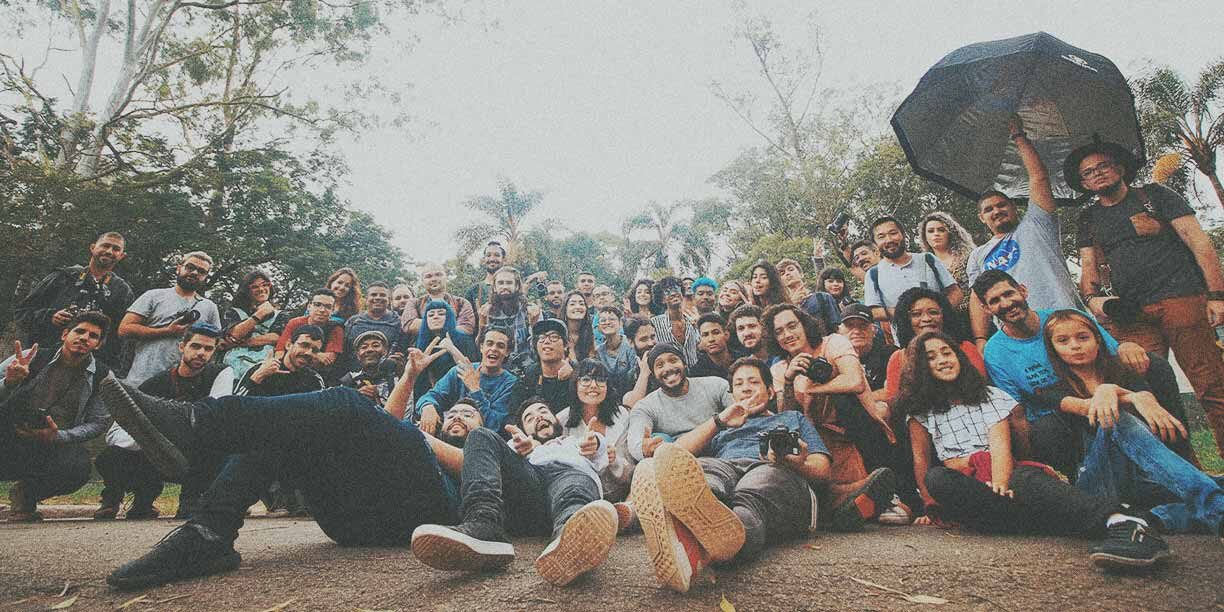
Many businesses now prioritize environmental, social, and economic impact like never before. To move the needle in a positive direction for local and global communities, companies are increasingly investing in corporate social responsibility (CSR) initiatives.
If you manage a growing business or are an eager entrepreneur, use these 12 responsible businesses as inspiration to strive for a higher standard. We’ve also included a few potential options to consider if you’re a nonprofit looking for a corporate partner who believes in your mission and stands behind your cause.
Social responsibility is a movement to build a more inclusive and sustainable society and economy while preserving the planet through dedicated conservation efforts. Beyond that, it also benefits companies’ recruiting, employee engagement, and consumer marketing efforts.
A report from Aflac on CSR initiatives found that 77% of consumers are “motivated to purchase from companies committed to making the world better,” and 49% of Americans say it is more important for a company to “make the world a better place” than “make money for its shareholders.”¹
From B Corps to companies with robust CSR programs, for-profit organizations have increasingly aligned with relevant causes and social good programs.
1. Classy
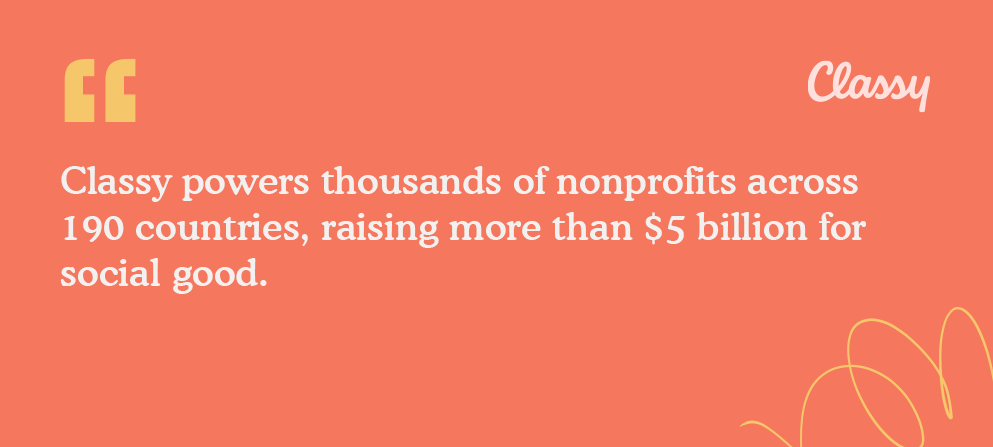
Really, claiming the number one spot? We know how it looks, but here at Classy, we hold ourselves to the highest standard.
Classy’s comprehensive fundraising suite helps organizations transform supporters’ intent into impact with tools built to support every stage of the donor journey.
As a Certified B Corporation, we prioritize our stakeholder promise to empower nonprofits to offer an exceptional giving experience without sacrificing an inclusive work environment or sustainable future. This philosophy has led to programs like the Classy Awards, now the largest impact awards program in the country, and ClassyGives, an innovative volunteering program for our community.
We continually strive to deliver unquestionable value to all customers and their supporters, as well as our team, investors, and community. To ensure our operations and impact are sustainable, responsible, and environmentally conscious, we formalized the following company-wide environmental commitments:
- Achieve carbon neutrality
- Achieve supply chain sustainability
- Achieve a culture of environmentally conscious stakeholders
Additionally, we offer an immersive experience called the Classy Collaborative, our annual nonprofit conference, to help elevate and advance the social sector. This multi-day event helps nonprofit organizations gain insights, strategies, and inspiration for greater impact.
A Partner to Support Your Mission
2. Dr. Bronner’s
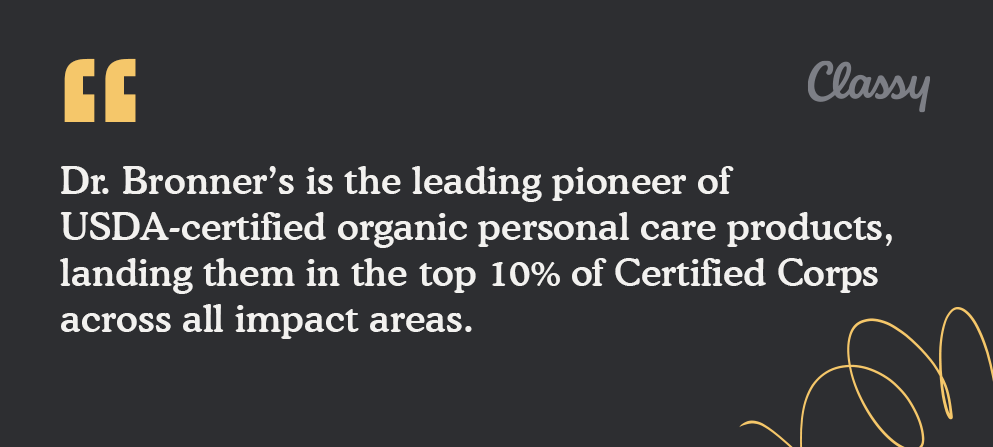
Holding its manufacturing standards to the greatest level, Dr. Bronner’s has been certified as a B Corporation since 2015. Now the top-selling brand of organic and fair-trade body care in the U.S., this family-owned and run company has steadily risen through the ranks.
This company makes socially and environmentally responsible products of the highest quality while dedicating its profits to building, promoting, and advancing positive social change in everything from healthcare to human rights.
Dr. Bronner’s is the pioneer of USDA-certified organic personal care products, guiding the social responsibility efforts within the industry. The company’s exemplary societal and environmental impact landed it in the top 10% of Certified Corps across all impact areas, proving that its strategy can lead the way for other companies wanting to join the movement.
To ensure fair and just treatment of farmers and workers worldwide, Dr. Bronner’s continues to offer education initiatives and create fair-trade projects to support its mission. The company also educates its farming partners in implementing carbon-sequestering farming practices and regenerative organic agriculture.
In addition, its products are free from synthetic preservatives, petrochemicals, synthetic-foaming agents or thickeners, packaged in 100% recyclable materials, and never tested on animals. Each product is 100% biodegradable, and 33% of all profits go to social and ecological projects.
3. Google
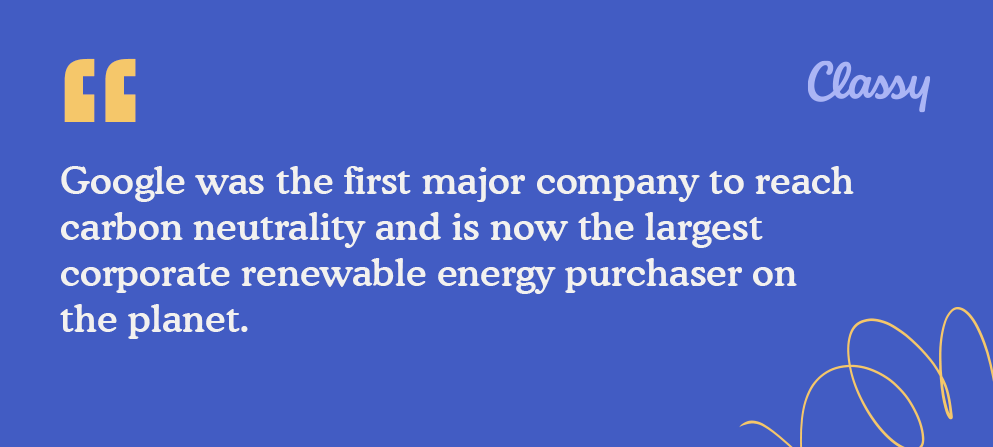
While Google is carbon neutral today, the company aims to run on carbon-free energy by 2030. Its goal is to not only pursue new carbon-free technologies but also demonstrate that a fully-decarbonized future is possible for everyone.
From facilitating green commuting to employee gift matching and paid volunteer time off, Google inspects nearly every part of its business with a social-impact lens.
4. Ben & Jerry’s
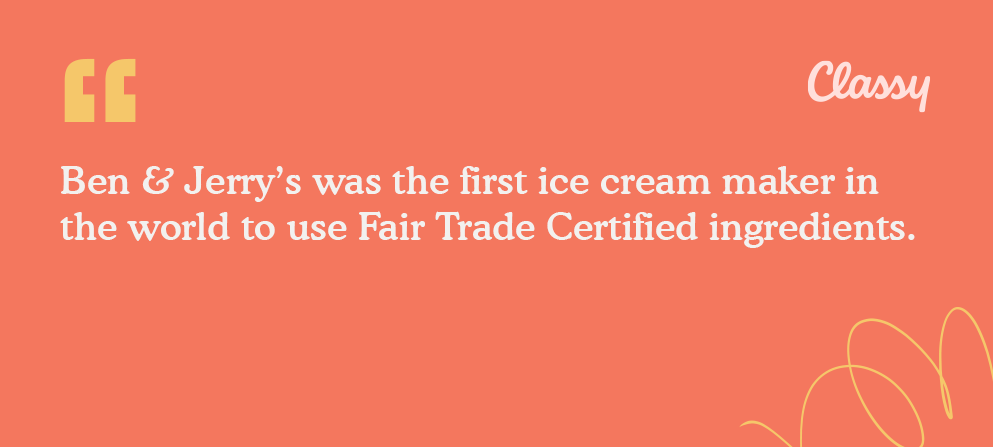
Ice cream tastes just a little sweeter when you know the makers work to promote safe, socially responsible ingredients and business practices. Since the 1980s, Ben & Jerry’s has supported several vital causes, many of which tie directly to the business of making ice cream.
In 1989, it first opposed recombinant bovine growth hormone use in cows due to “its adverse economic impact on family farming.” It also uses its packaging to support the family farm organization, Farm Aid.
The company even created the Ben & Jerry’s Foundation, which encourages its employees to give back to their communities and offers grants for social justice programs.
Ben & Jerry’s commitment to fair trade motivated the company to become the first ice cream maker in the world to use Fair Trade Certified ingredients. This decision aligns with its values to use environmentally-friendly farming practices, implement fair labor standards, and invest in local communities.
The company further amplifies its impact with the Fairtrade premium, an additional amount paid on top of farmers’ fair price.
5. LEGO
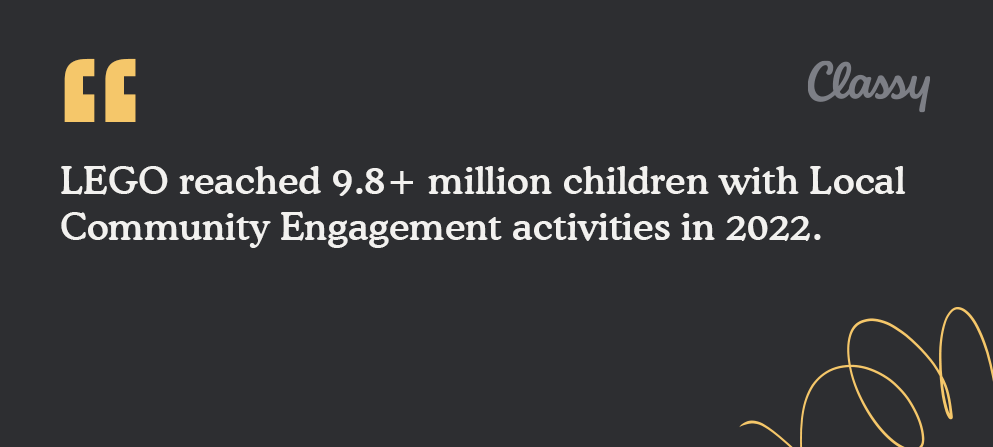
One of the most notable examples of how social responsibility can serve as an incredible asset to a well-known brand is the LEGO Group.
The LEGO Group’s dedication to social impact is somewhat recent (a 2014 Greenpeace video put pressure on the toy maker to end its 50-year partnership with Shell Global due to Shell’s plans to drill in the Arctic). Still, the extent of its commitment has made the Danish company a shining example of the far-reaching impact of CSR.
In September 2020, the LEGO Group announced an investment of $400 million over the next three years to support its social responsibility and sustainability efforts. To deliver on its goal to achieve carbon neutrality, LEGO signed an agreement to set up its first-ever carbon-neutral plant in Vietnam, with production commencing in 2024.
Developers plan to rely completely on rooftop solar panels and a nearby solar farm to generate all power throughout the facility. Additionally, the company will start by phasing out single-use plastic boxes to make all packaging sustainable by the end of 2025.
The company’s Sustainable Materials Programme will continue to advance, focusing on expanding its use of BioBricks. Additionally, research into new, more sustainable plastics from renewable and recycled sources is a priority, as is partnering with other leaders in the industry to find durable, high-quality materials that keep the environment front of mind.
The LEGO Group also aims to reach children worldwide with learning through play. In 2021, the LEGO Group, the LEGO Foundation, and UNICEF announced a three-year partnership that will invest $2.5 million in providing resources to community-based family support programs to help caregivers understand the lifelong benefits of incorporating play into their everyday lives.
6. Levi Strauss
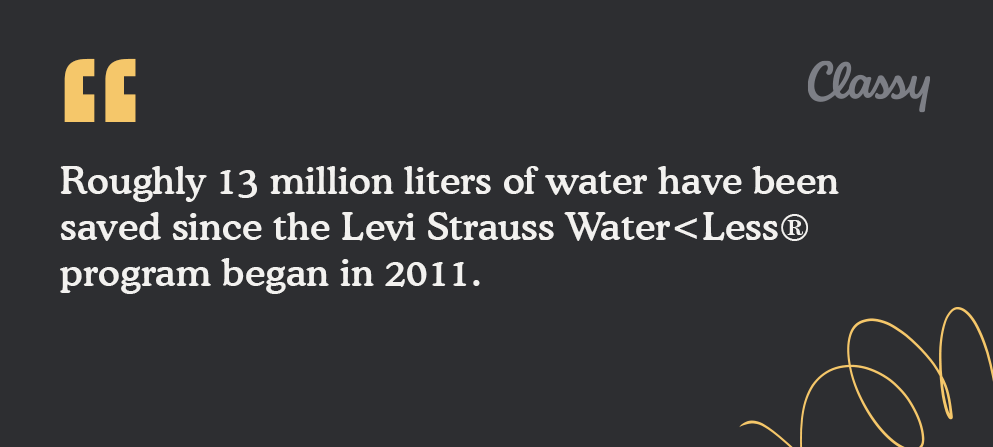
Are your jeans contributing to water scarcity? Most of us probably don’t think about this when shopping, but it’s a critical question for Levi Strauss.
In recent years, the company has committed to reducing the amount of water used to produce its jeans, a product it has made since 1873.
The company created the first product tag in 2009, Care Tag for Our Planet, which offers tips on preserving your clothing and where to donate them when you’re ready. Levi Strauss works alongside Cotton Inc.’s Blue Jeans Go Green to collect used clothing and sells preowned or restored vintage clothing to reduce its carbon footprint.
As part of its effort to reduce the amount of water used in manufacturing, Levi Strauss adopted the Water<Less approach that ensures all key suppliers become distinguished Water<Less facilities by 2025 to alleviate water stress.
All owned-and-operated U.S. and Canadian retail locations, along with all U.S. wholesale locations, now use 100% post-consumer waste stock for print materials. Additionally, all new mannequins come from 100% recycled-base stock, and the company currently pilots recycled denim coat hangers in several locations.
7. Warby Parker
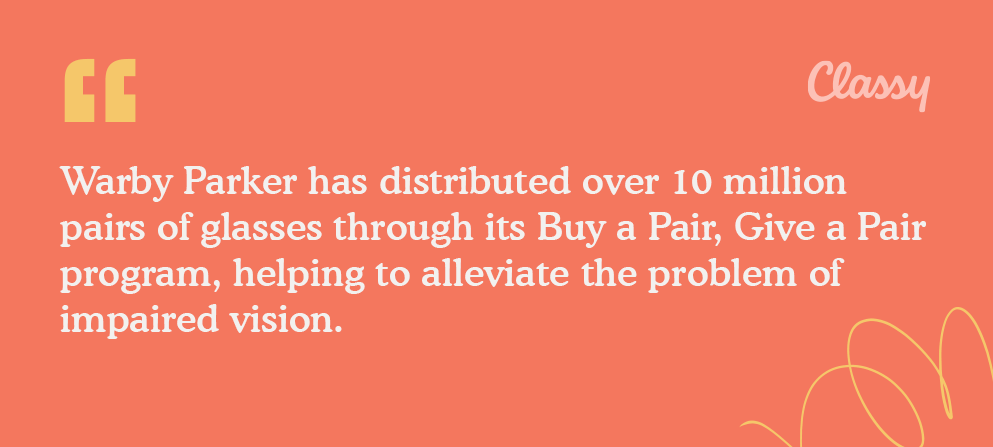
To help simplify the task of finding the right pair of glasses, Warby Parker sends customers five different frames to try on before making a decision. But knowing that a functional pair of glasses can be life-changing for many people, the B Corp also works to provide glasses for those in need.
Through its Buy a Pair, Give a Pair program, Warby Parker makes a monthly donation to its nonprofit partners, such as VisionSpring, to bring prescription eyewear to people in developing countries.
8. Microsoft
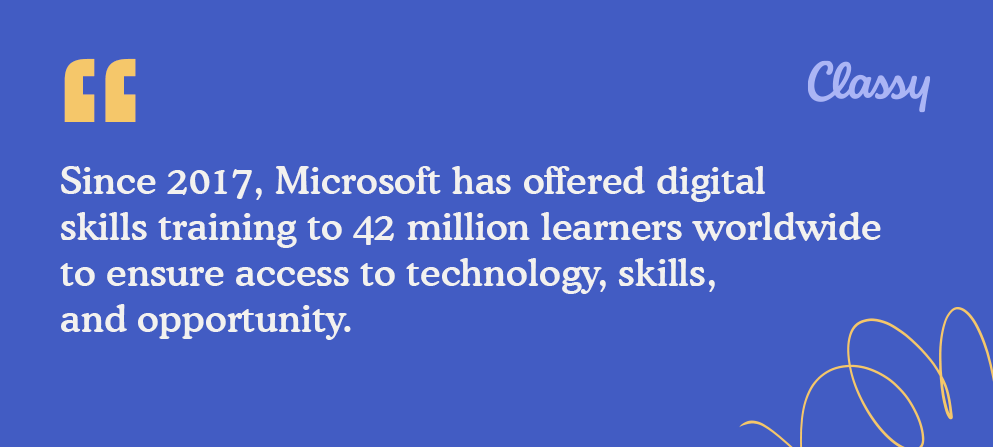
Microsoft changed how the world works, studies, and plays with computers and software. But its ambitions go far beyond the screen.
The company, founded by Bill Gates and Paul Allen, began its giving program in 1983 when the fledgling company raised $17,000 for charity. As its philanthropy webpage explains, Microsoft’s giving program has given time (employees volunteered more than 720,000 hours for nonprofits in 2022 alone) and cash. In 2022, the program raised over $255 million (with company match) for nonprofits.²
The software giant also created Microsoft Philanthropies, a social good initiative that works with nonprofits, governments, and businesses to create “a future where every person has the skills, knowledge, and opportunity to achieve more.” Initiatives cover everything from providing computer education, offering grants for nonprofits, and forming partnerships with organizations worldwide.
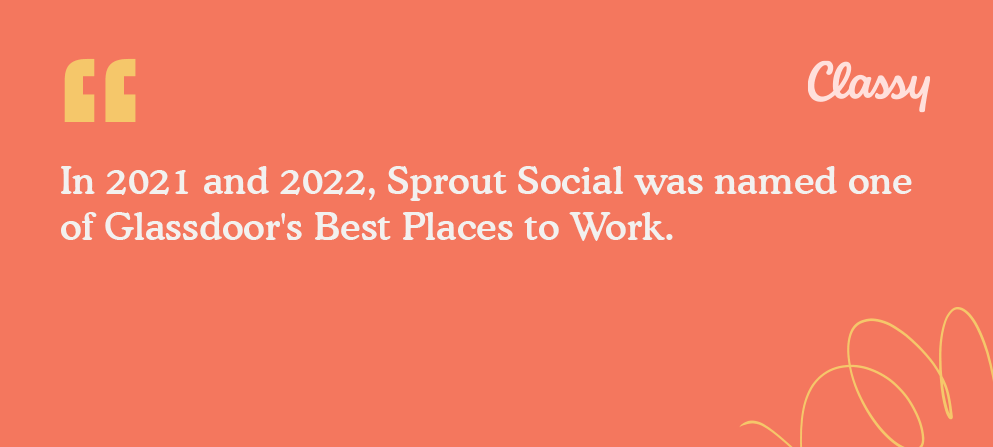
A renowned social media management and intelligence tool, over 30,000 brands worldwide use Sprout Social. The company believes that building best-in-class software and a beloved brand is not just about its product and services but also about prioritizing integrity, sustainability, and humanity in everything it does.
To reduce waste and commit to sustainable practices, Sprout Social is proud to report that over 90% of the electronics it purchases are ENERGY STAR Certified. Additionally, over 50% of the organizations in its supply chain are carbon neutral or have pledged to be by 2050, and 100% of its U.S. locations are ENERGY STAR Certified buildings.
Social impact is a top priority for the company, which ladders up to its $500,000 annual donation commitment to organizations that fight discrimination and support marginalized communities.
To stay open, honest, and accountable, Sprout Social reports on its website that 55% of its executive team and 43% of its Board of Directors is diverse in gender or race.
10. Lemonade
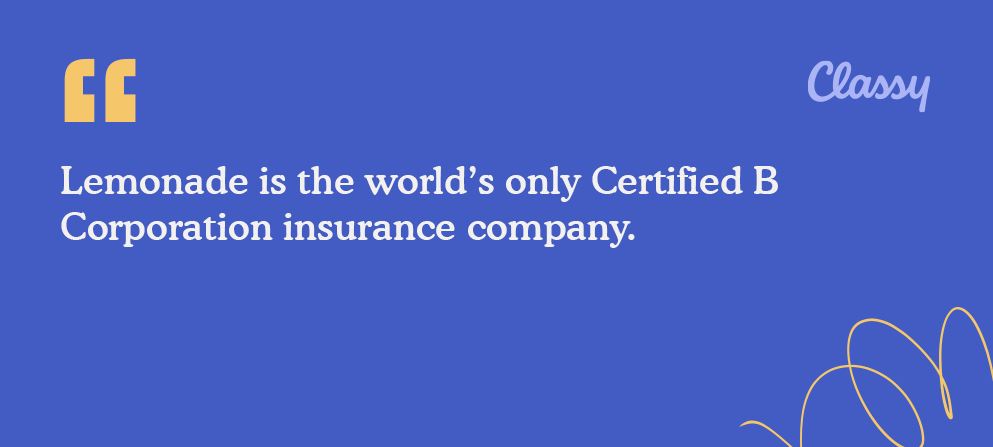
Lemonade serves to rebuild insurance as a social good. To support its mission, the company launched the Lemonade Giveback.
When purchasing a Lemonade policy, customers are asked to select a nonprofit they want to support. Then, once a year, Lemonade tallies up the unclaimed money left from their insurance premium and donates it to that organization.
In 2022, the company gave over $1.8 million to charities, including Pencils of Promise, To Write Love On Her Arms, Breast Cancer Research Foundation, and more.
11. Stitch Fix
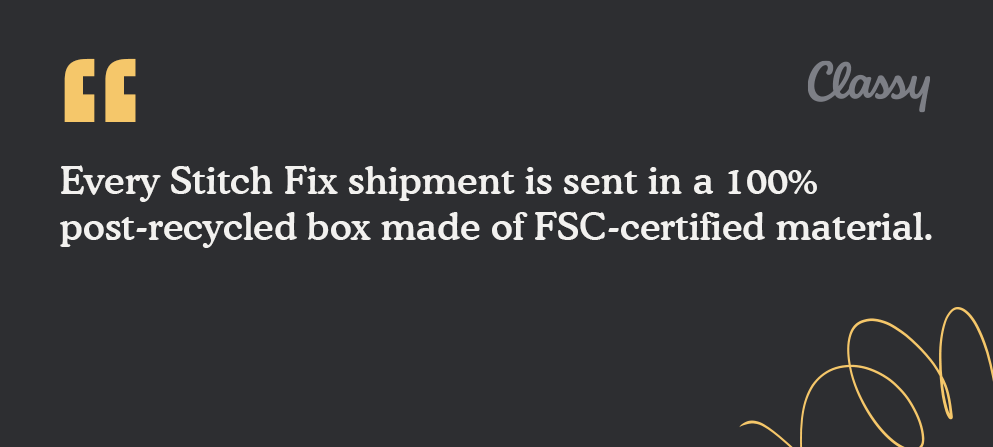
An online personal-styling service founded in 2011, Stitch Fix takes measurable action toward a healthier planet. From its suppliers to the materials it works with, this company commits to using data, resources, and partnerships to catalyze change.
By 2025, Stitch Fix plans to source 100% of the main materials in its private-label products more sustainably than conventional alternatives. In 2022, the company reached 59% of its total goal.
Each vendor relationship centers on its Vendor Code of Ethics. This ensures a shared commitment to minimizing environmental impact and providing working conditions that uphold all labor laws and standards.
Additionally, Stitch Fix’s data-driven inventory model helps reduce waste by understanding what clients want to predict inventory needs more accurately. When excess inventory becomes problematic, the company also has partnerships to direct products to alternate channels rather than directly to a waste stream.
12. Purely Elizabeth
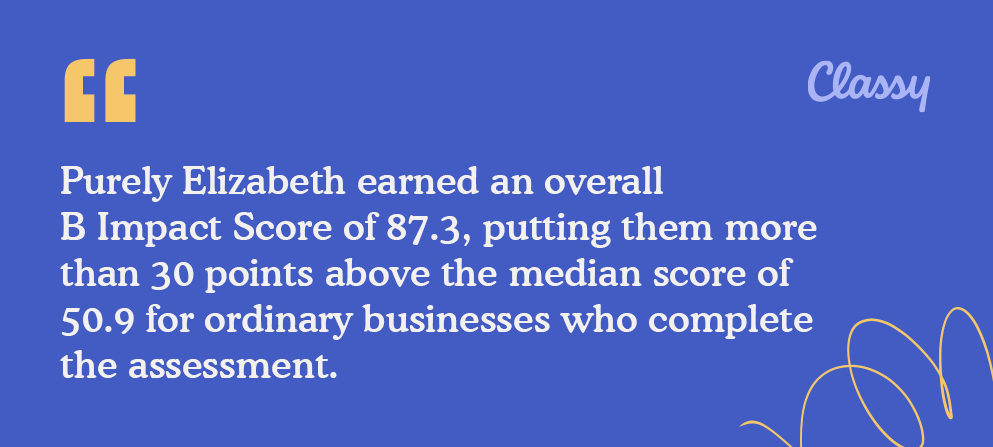
As a booming natural foods company, Purely Elizabeth is a proud Certified B Corporation continually using business as a force for good. The company aims to provide nutritious snacks that serve the planet and its people.
To start, the company partners with a women-owned, coconut-sugar supplier in Indonesia and a B Corp-approved granola manufacturing partner to capitalize on the power of collaboration.
In addition to its impact on the planet, Purely Elizabeth prioritizes its impact on all employees, customers, and communities through employee volunteer days, flexible time off, and generous benefits packages.
The company approaches sustainability from various angles, including:
- Requiring green standards for the Purely Elizabeth office (e.g., lower water usage, composting, light sensors, and reducing overall waste and energy consumption)
- Sharing local resources with remote employees to adapt and uphold sustainable practices
- Upholding Non-GMO Project Verified certification for most Purely Elizabeth products
- Sourcing organic ingredients whenever possible
Additionally, the team ensures they always meet the highest standards of performance, transparency, and accountability by going through an audit every three years to reevaluate their goals, mission, and direction.
The numbers say it all: 90% of consumers are likely to trust and be loyal to socially responsible companies compared to companies that don’t contribute to positive change, and 92% of consumers want to buy a product that supports a good cause.³
Seeing how critical CSR is to brands worldwide, more and more companies have adopted climate change, renewable energy, and other social good initiatives into core business models. These organizations show how far-reaching and varied corporate social responsibility programs can be.
Any business can prioritize social impact by donating its product to those in need, fundraising for a worthy cause, or starting a charitable foundation. Along with its good for society and your local community, it also benefits your brand and attracts customers and talented employees.
One of the simplest ways businesses can take a philanthropic step is to sponsor a local nonprofit organization. Corporate sponsorships between nonprofits and for-profit businesses can take many forms, so read our blog, Corporate Sponsorship for Nonprofits: The Basics, to learn where to get started.
Article Sources
- “Aflac CSR Survey,” Aflac, last accessed April 6, 2023, https://www.aflac.com/docs/about-aflac/csr-survey-assets/2019-aflac-csr-infographic-and-survey.pdf.
- “Achieving More,” 2022 Impact Summary, Microsoft, last accessed April 6, 2023, https://query.prod.cms.rt.microsoft.com/cms/api/am/binary/RE5b9S0.
- “A List of Statistics That Demonstrate CSR Performance,” Impact Marketing Club, last accessed April 6, 2023, https://impactmarketingclub.com/list-statistics-demonstrate-importance-csr/.

Classy's Impact Report



